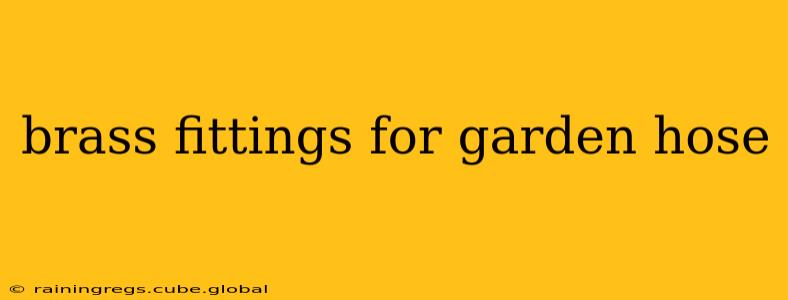Choosing the right fittings for your garden hose can make all the difference in the longevity and efficiency of your watering system. Brass fittings, known for their durability and resistance to corrosion, are a popular choice among homeowners and professionals alike. This guide dives deep into the world of brass garden hose fittings, covering everything from their advantages to selecting the best ones for your needs.
Why Choose Brass Garden Hose Fittings?
Brass fittings offer several key advantages over their plastic or cheaper metal counterparts:
-
Durability: Brass is a robust metal that can withstand significant wear and tear, resisting damage from accidental drops, impacts, and general use. This translates to a longer lifespan compared to plastic fittings, which are prone to cracking or breaking.
-
Corrosion Resistance: Unlike many other metals, brass exhibits excellent corrosion resistance, even in damp or wet environments. This is crucial for outdoor applications like garden hoses, where exposure to the elements is constant. This resistance ensures your fittings won't rust or degrade over time, maintaining a reliable connection.
-
Strength and Longevity: Brass fittings are strong enough to handle the water pressure of most garden hoses without leaking or failing. Their inherent strength ensures a secure connection, preventing frustrating leaks and wasted water.
-
Aesthetic Appeal: Brass fittings possess a classic, elegant look that complements many garden styles. Their golden hue adds a touch of sophistication to any outdoor setting.
What Types of Brass Garden Hose Fittings are Available?
The market offers a wide variety of brass garden hose fittings, each designed for specific purposes. Some common types include:
-
Brass Hose Connectors: These connect the hose to the faucet or spigot. They often feature a threaded end for easy attachment.
-
Brass Hose Adapters: These are used to connect hoses with different diameters or types of connectors. They bridge the gap between incompatible fittings, allowing for greater flexibility in your setup.
-
Brass Hose Clamps: These secure the hose to the fitting, preventing leaks and ensuring a tight seal. While not always made of brass, they are often paired with brass fittings for optimal performance.
-
Brass Spray Nozzles and Connectors: These are specialized brass fittings that allow you to control the spray pattern and water flow of your hose. Different nozzles offer various functions, from a gentle mist to a powerful jet.
-
Brass Quick Connect Fittings: These fittings offer a quick and easy way to connect and disconnect your hose from different attachments, without the need for tools or manual tightening. They enhance convenience and save time.
What are the Different Sizes of Brass Garden Hose Fittings?
Brass garden hose fittings come in various sizes, typically measured in inches or millimeters. The most common sizes are:
- 1/2 inch: A common size for standard garden hoses.
- 5/8 inch: Slightly larger than 1/2 inch, often used for heavier-duty hoses or higher water pressure applications.
- 3/4 inch: Used for larger diameter hoses, offering increased water flow.
It's crucial to match the fitting size to your hose diameter to ensure a proper and leak-free connection.
How to Choose the Right Brass Garden Hose Fittings?
Selecting the appropriate brass garden hose fittings involves considering several factors:
- Hose Diameter: Measure the diameter of your garden hose to ensure compatibility with the fittings.
- Water Pressure: If you have high water pressure, opt for heavier-duty brass fittings designed to handle the increased force.
- Application: Consider the specific application for your fittings. Different fittings are designed for different purposes (e.g., connectors, adapters, spray nozzles).
- Budget: While brass fittings are generally more expensive than plastic ones, their superior durability and longevity justify the higher cost in the long run.
What is the Difference Between Brass and Plastic Garden Hose Fittings?
The main differences lie in durability and longevity. Brass fittings are far more resistant to damage, corrosion, and wear and tear than plastic fittings. Plastic fittings are more prone to cracking, breaking, and leaking, especially under high pressure or extreme temperatures. Brass fittings offer superior strength, resistance, and a longer lifespan, justifying their higher initial cost.
How Long Do Brass Garden Hose Fittings Last?
With proper care and maintenance, brass garden hose fittings can last for many years, even decades. Their corrosion resistance and robust construction ensure a long service life, making them a worthwhile investment for any homeowner.
By understanding the various types, sizes, and advantages of brass garden hose fittings, you can choose the best ones to meet your needs and create a reliable, long-lasting watering system for your garden. Remember to always measure your hose diameter before purchasing any fittings.
